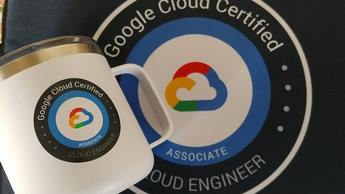Use VCE Exam Simulator to open VCE files

Get 100% Latest Cloud Practice Tests Questions, Accurate & Verified Answers!
30 Days Free Updates, Instant Download!
Professional Cloud Architect Premium Bundle

Google Cloud Certification Practice Test Questions, Google Cloud Exam Dumps
ExamSnap provides Google Cloud Certification Practice Test Questions and Answers, Video Training Course, Study Guide and 100% Latest Exam Dumps to help you Pass. The Google Cloud Certification Exam Dumps & Practice Test Questions in the VCE format are verified by IT Trainers who have more than 15 year experience in their field. Additional materials include study guide and video training course designed by the ExamSnap experts. So if you want trusted Google Cloud Exam Dumps & Practice Test Questions, then you have come to the right place Read More.
Cloud computing has metamorphosed from a peripheral concept into the very backbone of contemporary information technology. As organizations increasingly seek agility, scalability, and cost-efficiency, cloud platforms have become indispensable. The digital transformation across enterprises, both large and small, underscores the importance of cloud expertise. Companies no longer merely consider cloud solutions as optional tools; they have become pivotal in driving innovation and operational efficiency. The pervasive adoption of cloud technologies has, in turn, created a surging demand for professionals adept at navigating these platforms with finesse and strategic insight.
Research indicates that a substantial proportion of businesses, nearly forty percent, grapple with a shortage of adequately skilled cloud professionals. This scarcity has made it imperative for individuals to validate their competencies and distinguish themselves in a crowded job market. One of the most effective avenues to achieve this distinction is through cloud certifications, which act as credible attestations of one’s knowledge and applied proficiency. Certifications offer not only a tangible demonstration of capability but also a psychological assurance to employers that candidates possess the requisite skills to design, deploy, and manage cloud-based systems.
The trajectory of cloud computing has been remarkable. Once a niche solution confined to specialized IT departments, cloud technology has now pervaded every stratum of enterprise operations. From hosting applications and storing data to orchestrating complex workloads and enabling artificial intelligence, the cloud has become a ubiquitous facilitator of modern business operations. The strategic importance of cloud adoption is further magnified by its potential to optimize cost structures. By leveraging cloud infrastructure, organizations can minimize upfront capital expenditure while dynamically scaling resources to meet fluctuating demand, thereby fostering a more resilient and adaptive technological environment.
As the global IT landscape continues to expand, the necessity for skilled cloud professionals grows in tandem. Organizations are increasingly investing in cloud-based infrastructures to gain competitive advantage, enhance operational flexibility, and ensure rapid deployment of new services. However, the influx of professionals seeking positions in cloud computing has intensified competition. In this context, possessing demonstrable expertise becomes crucial. Certifications serve as a differentiator, signaling to employers that a candidate is not merely familiar with cloud concepts but possesses the applied knowledge necessary to tackle real-world challenges.
The scope of cloud computing careers is broad and diverse. Roles span from architecture and system administration to security, data management, and software development. Each of these roles demands a nuanced understanding of cloud platforms, deployment strategies, and best practices. Professionals who obtain certifications often find that their marketability increases significantly, opening doors to higher-level responsibilities and lucrative compensation packages. This enhanced employability is particularly salient in an era where businesses are racing to adopt multi-cloud strategies, hybrid cloud models, and advanced automation. Expertise in these areas positions professionals as pivotal contributors to organizational growth.
Cloud certifications provide a structured pathway for professionals to acquire and validate essential skills. They offer a comprehensive framework that encompasses both theoretical knowledge and practical application. Beyond serving as a credential, certifications imbue individuals with the confidence to design and implement cloud solutions effectively. They cover an array of competencies, including infrastructure design, application deployment, data management, security, and cost optimization. For enterprises, the presence of certified personnel ensures that cloud initiatives are executed efficiently and securely, reducing risks associated with misconfiguration or suboptimal implementation.
Earning a certification also signifies a commitment to continuous learning. The cloud ecosystem evolves rapidly, with new services, tools, and methodologies emerging at a relentless pace. Certified professionals demonstrate adaptability and a proactive approach to staying abreast of technological advancements. This proactive mindset is particularly valued by employers seeking personnel who can anticipate challenges, propose innovative solutions, and maintain operational excellence in dynamic environments. The process of preparation for certification exams fosters analytical thinking, problem-solving skills, and a deeper appreciation of architectural principles, all of which contribute to enhanced professional competency.
The financial landscape of cloud computing highlights its transformative impact on the technology sector. Industry analyses have projected global expenditures on cloud infrastructure to exceed one hundred and sixty billion dollars . This substantial investment underscores the strategic importance of cloud adoption across industries. Amazon Web Services emerged as the most prominent player in this domain, exhibiting a remarkable annual growth trajectory. Its dominance has been complemented by Microsoft Azure and Google Cloud, both of which have cultivated robust ecosystems and certification programs to nurture skilled professionals.
The growth of cloud platforms is not limited to large enterprises. Small and medium-sized businesses are increasingly leveraging cloud services to access sophisticated technology without the burden of maintaining extensive in-house infrastructure. This democratization of access has expanded the need for professionals who can architect, implement, and manage cloud environments efficiently. The proliferation of cloud services, including platform-as-a-service, infrastructure-as-a-service, and software-as-a-service, further accentuates the necessity for specialized knowledge. Professionals equipped with certifications are positioned to navigate this intricate landscape with precision, offering tangible value to employers and clients alike.
Beyond market recognition and career advancement, cloud certifications provide tangible skills applicable to day-to-day operations. Professionals learn to design scalable applications, optimize resource allocation, and ensure compliance with security and governance standards. They gain proficiency in orchestrating cloud workflows, managing storage and computation resources, and leveraging advanced services to meet organizational objectives. The process of preparing for certification exams equips individuals with a holistic understanding of cloud ecosystems, enabling them to troubleshoot complex scenarios and implement solutions that are both robust and cost-efficient.
Certification also fosters a mindset of strategic foresight. Professionals learn to anticipate future requirements, evaluate emerging technologies, and recommend architecture enhancements that align with business objectives. This foresight is critical in hybrid and multi-cloud environments, where decisions regarding workload distribution, data sovereignty, and service integration carry significant operational implications. By internalizing best practices and architectural principles through certification preparation, individuals enhance their ability to make informed, strategic decisions that drive organizational success.
The long-term career impact of cloud certifications is profound. Certified professionals often experience accelerated career progression, higher earning potential, and increased recognition within their organizations. The skills acquired through certification preparation empower individuals to contribute meaningfully to strategic initiatives, positioning them as indispensable assets in the digital age. Employers increasingly value the assurance that certified personnel bring, as it mitigates risks and ensures that cloud deployments are conducted efficiently and securely.
Furthermore, certifications facilitate mobility across roles and platforms. Professionals are equipped to transition between cloud providers, adapt to evolving technologies, and embrace new responsibilities with confidence. This versatility is particularly valuable in a landscape where technological disruption is constant, and the ability to remain relevant is contingent upon continuous learning and skill validation. In essence, cloud certifications serve not merely as a credential but as a catalyst for sustained professional growth and influence within the technology domain.
Cloud expertise transcends the technical realm, influencing organizational strategy, innovation, and competitive positioning. Professionals with deep understanding of cloud ecosystems can advise on architectural decisions, optimize resource allocation, and enhance operational resilience. They contribute to the development of innovative solutions that leverage cloud capabilities for automation, analytics, and customer engagement. The transformative potential of cloud knowledge extends to fostering collaborative practices, integrating cross-functional teams, and enabling seamless digital transformation initiatives.
In a rapidly evolving technological landscape, the ability to anticipate trends, evaluate emerging tools, and implement solutions with foresight is invaluable. Professionals with cloud certifications are uniquely positioned to bridge the gap between technological capability and business strategy, ensuring that organizations harness the full potential of cloud computing. Their expertise not only drives operational efficiency but also cultivates a culture of innovation, adaptability, and continuous improvement.
Amazon Web Services has become the cornerstone of global cloud computing, offering a comprehensive suite of tools that empower organizations to innovate and scale without the limitations of traditional infrastructure. AWS dominates the market not only because of its sheer breadth of services but also because of its reliability, adaptability, and continuous evolution. For professionals aiming to build a career in cloud computing, AWS certifications serve as a critical stepping stone, with the Certified Solutions Architect – Associate considered the most coveted entry point on the architectural path.
This certification validates an individual’s capacity to design distributed systems that are resilient, secure, and efficient. It demonstrates proficiency in translating complex business requirements into practical technical solutions. In an environment where enterprises are rapidly shifting applications to the cloud, professionals who hold this certification emerge as indispensable contributors to strategic innovation. The AWS Certified Solutions Architect – Associate is not merely an exam but a marker of one’s readiness to tackle large-scale challenges with precision.
The path toward becoming a certified solutions architect does not impose strict prerequisites, yet practical experience plays a significant role in preparing for the examination. Candidates are expected to have at least a year of hands-on experience in deploying applications on the AWS platform. Familiarity with a high-level programming language helps in understanding automation and scripting aspects. Furthermore, an understanding of hybrid deployment strategies, where on-premises infrastructure intersects with cloud services, is essential.
Professionals embarking on this journey are also encouraged to have knowledge of fundamental networking concepts, storage management, and security controls. This foundational knowledge is indispensable because the exam evaluates a broad spectrum of competencies. For example, the ability to recognize the requirements of an application, propose appropriate services, and ensure scalability are intertwined skills that demand both theoretical comprehension and applied expertise.
The AWS Certified Solutions Architect – Associate certification focuses on a collection of skills that are indispensable for modern enterprises. These objectives are designed not only to test knowledge but also to ensure that candidates can handle real-world scenarios. At its essence, the certification emphasizes designing and deploying highly available applications, migrating workloads seamlessly into the cloud, and optimizing architectures for performance and cost efficiency.
Candidates must demonstrate the ability to lift and shift existing applications into AWS while ensuring minimal disruption to business operations. They should be adept at selecting the most appropriate services for computation, data storage, and security requirements. Another focal point is the identification of best practices for secure and reliable architecture. Beyond these technical elements, cost management also plays a vital role. Professionals must be capable of employing strategies to control expenditure, optimize resource allocation, and ensure that businesses extract maximum value from their cloud investments.
Preparing for the certification exam is a transformative journey that equips individuals with a suite of competencies applicable far beyond the test itself. During preparation, professionals gain the ability to design systems that can handle dynamic workloads and unexpected surges in demand without faltering. They also learn how to integrate services in a way that minimizes latency and maximizes resilience.
Security is another profound area of focus. Candidates refine their knowledge of encryption, identity management, and access controls to ensure that applications hosted on AWS maintain confidentiality and integrity. Disaster recovery strategies are also a vital part of the learning process, preparing professionals to devise architectures that remain robust even in the face of catastrophic events. This multifaceted skill set positions certified architects as guardians of reliability and efficiency within an organization’s technological framework.
The significance of the certification extends well beyond theory. In real-world contexts, certified solutions architects play a pivotal role in guiding enterprises through digital transformation initiatives. They are responsible for designing infrastructures that can accommodate business growth while maintaining performance. Their expertise enables organizations to migrate mission-critical workloads into AWS without compromising security or operational continuity.
Moreover, certified architects are often tasked with optimizing cloud spending. They analyze utilization patterns, recommend alternative service configurations, and employ strategies such as auto-scaling to align consumption with actual demand. This stewardship of resources ensures that organizations derive maximum return on investment from their cloud adoption. By aligning technological decisions with business goals, solutions architects become strategic partners in the overall success of the enterprise.
Obtaining the AWS Certified Solutions Architect – Associate certification opens a myriad of career pathways. Professionals can pursue roles such as Solutions Architect, Software Architect, or Senior Cloud Architect, each offering opportunities to apply architectural principles in diverse contexts. These roles extend across industries ranging from finance and healthcare to e-commerce and government, as the demand for cloud expertise permeates every sector.
Employers value certified individuals for their ability to bridge the gap between business objectives and technological execution. As enterprises increasingly embrace hybrid and multi-cloud strategies, certified architects become crucial in ensuring interoperability and seamless integration across varied platforms. This versatility makes them not only highly employable but also indispensable to organizations navigating the complexities of modern IT landscapes.
The certification’s impact is not limited to career mobility; it also manifests in tangible financial rewards. Professionals who earn this credential often witness substantial salary increases, with the potential for a rise of nearly twenty percent compared to non-certified peers. The average salary for a certified solutions architect hovers around one hundred and twenty-three thousand dollars annually, with variations depending on region, experience, and the scale of responsibilities.
This earning potential underscores the recognition that employers attach to the certification. It is perceived as a hallmark of competence, assuring organizations that they are investing in talent capable of designing systems that are secure, scalable, and cost-effective. For professionals, the financial benefits complement the intellectual fulfillment of mastering one of the most prestigious certifications in the cloud computing sphere.
The journey toward earning the AWS Certified Solutions Architect – Associate requires a blend of structured study and practical experimentation. Professionals often engage in hands-on labs to simulate real-world scenarios, thereby internalizing the nuances of system design and deployment. Practice tests also serve as valuable tools, allowing candidates to familiarize themselves with the exam’s format while identifying areas that require further refinement.
Another crucial aspect of preparation is staying abreast of AWS’s continuous evolution. The platform introduces new services and updates existing ones at a relentless pace. Professionals must cultivate the habit of ongoing learning, leveraging documentation, whitepapers, and community forums to keep their knowledge current. This diligence not only enhances exam readiness but also ensures that certified individuals remain relevant long after they achieve the credential.
The AWS Certified Solutions Architect – Associate carries implications that extend into the broader technology ecosystem. It fosters a culture of excellence, motivating professionals to approach system design with rigor and creativity. The certification also serves as a foundation for more advanced credentials, such as the AWS Certified Solutions Architect – Professional, which delves deeper into complex architectural patterns and enterprise-level solutions.
By pursuing certification, individuals also contribute to elevating industry standards. Organizations benefit from having certified staff who adhere to best practices, thereby reducing risks and enhancing operational efficiency. This ripple effect strengthens the overall ecosystem, creating a collective pool of talent capable of driving innovation across industries.
Microsoft Azure has established itself as a formidable competitor in the cloud computing arena, standing shoulder to shoulder with Amazon Web Services and Google Cloud. Its expansive suite of offerings caters to enterprises of all sizes, from fledgling startups to global conglomerates. Azure’s allure stems from its deep integration with Microsoft’s extensive ecosystem, particularly with tools and frameworks familiar to countless organizations, such as Windows Server, Active Directory, and SQL Server. This synergy makes Azure an attractive choice for businesses seeking a seamless migration into the cloud while maintaining compatibility with their existing infrastructures.
The Microsoft certification known as Implementing Azure Infrastructure Solutions, often referred to by its exam code 70-533, was designed to validate a professional’s ability to plan, implement, and manage infrastructure within the Azure platform. This certification demonstrates one’s competence in handling tasks such as virtual machine deployment, storage management, networking configuration, and application service integration. Though Microsoft has updated and introduced newer certifications over time, the 70-533 remains a milestone in the historical progression of Azure expertise and continues to symbolize proficiency in managing robust cloud architectures.
Azure has transformed into a cornerstone for modern businesses navigating digital transformation. It provides infrastructure-as-a-service, platform-as-a-service, and software-as-a-service models, offering unparalleled flexibility for organizations to adopt what suits their unique needs. The global cloud market has been growing at an extraordinary pace, with Azure capturing a significant share through continuous innovation and enterprise-grade reliability.
Enterprises benefit from Azure’s global network of data centers, ensuring low-latency access to services across continents. Furthermore, Azure’s security features, compliance certifications, and hybrid capabilities position it as the platform of choice for organizations in highly regulated sectors such as finance, healthcare, and government. The demand for professionals proficient in implementing Azure infrastructure solutions has surged as businesses pivot toward hybrid and multi-cloud strategies that require seamless integration, scalability, and airtight security.
While the 70-533 certification did not impose mandatory prerequisites, it was highly recommended that candidates possess practical experience before attempting the exam. A minimum of one year working with Azure infrastructure or comparable cloud environments was considered advantageous. This experience provided the foundational understanding needed to design and implement solutions effectively.
Professionals preparing for the certification typically had exposure to at least one high-level programming language, whether .NET, PHP, Ruby, or Python. This knowledge aided in deploying applications and understanding the nuances of platform services. Additionally, familiarity with networking principles, virtual private networks, load balancing, and IP addressing formed a crucial part of the preparation. Since Azure integrates seamlessly with Active Directory, knowledge of identity management and authentication systems also became indispensable. Those adept in scripting languages such as PowerShell gained an added advantage, as automation was often emphasized in Azure’s operational practices.
The Implementing Azure Infrastructure Solutions certification encompassed an extensive array of skills designed to prepare candidates for real-world challenges. Among the most significant objectives was the ability to design and configure virtual networks. Candidates learned to set up secure and resilient networking architectures that connected virtual machines and services across regions while safeguarding data in transit.
Another focal point was deploying and managing Azure App Services, enabling organizations to host scalable web applications without the need to manage the underlying infrastructure. Candidates were also expected to design strategies for storage, including blob storage, file shares, and database backups, ensuring that data remained both accessible and durable. The certification placed emphasis on high availability and disaster recovery, requiring knowledge of replication, failover, and recovery procedures that maintain business continuity.
The management of Azure SQL Databases was another critical component. Candidates learned to design, implement, and secure relational databases within Azure, balancing performance with cost considerations. They also gained expertise in configuring platform-as-a-service solutions, creating hybrid environments where on-premises resources interacted seamlessly with Azure services. Finally, automation through scripting and template deployment was an essential competency, empowering professionals to implement infrastructure at scale with efficiency and precision.
The preparation journey for this certification transformed candidates into proficient Azure practitioners. They acquired the ability to orchestrate virtual machine lifecycles, from creation and scaling to monitoring and termination. Mastery over backup and recovery strategies meant they could design systems resilient against outages and catastrophic data loss.
Equally significant was the understanding of security. Professionals became adept at configuring firewalls, managing role-based access controls, and applying encryption strategies to safeguard data. They also gained fluency in integrating identity solutions, ensuring that applications remained secure in hybrid and federated environments. Networking skills were honed through the design of load-balanced systems capable of sustaining surges in traffic without performance degradation.
Preparation also fostered a strategic mindset, encouraging candidates to think beyond the technical and focus on aligning cloud solutions with broader business objectives. By balancing performance, security, and cost efficiency, they became capable of crafting infrastructures that delivered tangible organizational value.
In the real world, certified Azure professionals became instrumental in driving organizational success. They were entrusted with designing infrastructures that supported critical applications, from enterprise resource planning systems to customer-facing platforms. Their expertise enabled businesses to migrate workloads to Azure with minimal disruption, ensuring continuity of operations while leveraging the elasticity of the cloud.
These professionals also played a crucial role in cost management. By analyzing usage patterns, implementing autoscaling, and choosing appropriate storage tiers, they optimized expenditure without compromising performance. In hybrid environments, they connected on-premises data centers to Azure, creating cohesive systems that combined the best of both worlds. Their deep understanding of security protocols allowed them to implement governance models that complied with regulatory standards, a particularly vital skill for industries where compliance is non-negotiable.
Earning the Implementing Azure Infrastructure Solutions certification opened the door to diverse career trajectories. Professionals often advanced into roles such as Solutions Architect, DevOps Engineer, Network Engineer, and Security Administrator. Each role demanded a slightly different application of skills, whether designing robust architectures, automating deployments, managing networks, or safeguarding digital assets.
Employers sought certified professionals because they provided assurance that cloud environments would be implemented effectively. In particular, organizations undergoing rapid transformation valued the ability of certified individuals to design solutions that were not only technically sound but also aligned with long-term strategic objectives. As Azure adoption spread globally, certified professionals found opportunities across industries, from small firms leveraging cloud services for agility to multinational enterprises migrating vast workloads to the platform.
Certification often translates into significant financial rewards. Professionals holding the 70-533 credential commanded impressive salaries, averaging around one hundred and thirty-six thousand dollars annually, with compensation ranging widely depending on location, experience, and specialization. This remuneration reflected the high demand and limited supply of skilled Azure professionals.
Beyond salary, the recognition attached to the certification carried immense value. It served as a testament to one’s commitment to professional development and mastery of Azure’s intricate capabilities. Employers viewed it as evidence of reliability and technical dexterity, positioning certified professionals as valuable assets within their teams.
Achieving the certification required a balanced approach to preparation. Candidates often engaged with online courses, study guides, and extensive hands-on practice. Azure’s own documentation and whitepapers proved invaluable, offering authoritative guidance on best practices. Practice exams allowed candidates to gauge their readiness, while sandbox environments enabled experimentation without fear of impacting production systems.
Many professionals emphasized the importance of practical immersion. Deploying virtual machines, configuring networks, and implementing backup solutions in real time provided insights that theory alone could not convey. Staying updated with Azure’s rapid innovations was equally important, as the platform evolved continually, introducing new services and updating existing ones. The discipline of consistent learning ensured that certified individuals remained relevant in a dynamic technological landscape.
The Implementing Azure Infrastructure Solutions certification carried implications that transcended individual achievement. It raised industry standards by ensuring that certified professionals adhered to best practices, thereby reducing risks associated with poorly designed infrastructures. Organizations benefited from improved efficiency, reliability, and cost optimization, while the broader technology ecosystem gained from a workforce equipped with verified skills.
For individuals, the certification often served as a gateway to more advanced credentials, such as those focusing on solutions architecture, DevOps, or security. It laid the foundation for a career characterized by continuous growth and adaptability, traits essential in a world where technological disruption is constant.
The landscape of cloud computing continues to broaden with an intensity that shows no signs of abating. Organizations worldwide are leveraging cloud platforms to gain resilience, efficiency, and elasticity in managing their digital workloads. Among the multitude of certifications available, two stand prominently for professionals aiming to establish credibility in administration and architecture. These are the AWS Certified SysOps Administrator Associate and the Google Cloud Architect Certification. Each credential reflects mastery of distinct capabilities, with one focusing on operational management and the other on solution design. Together, they epitomize the breadth of expertise demanded in today’s intricate technological ecosystems.
The AWS SysOps Administrator Associate certification is purpose-built for individuals entrusted with deploying, managing, and operating applications within the Amazon Web Services environment. Unlike roles oriented around development or architecture alone, this certification emphasizes day-to-day oversight, governance, and optimization of cloud resources. The certified administrator becomes a linchpin within an organization, ensuring not only the smooth functioning of deployed systems but also their security and cost-effectiveness.
Eligibility for this credential does not require formal prerequisites, yet practical exposure is indispensable. Professionals typically benefit from at least a year of hands-on experience working with AWS services. A working knowledge of system operations, monitoring tools, and networking principles enhances preparedness. Familiarity with topics such as load balancing, auto-scaling groups, fault tolerance, and identity access management significantly increases the probability of success.
The certification emphasizes core tasks that transform individuals into dependable custodians of AWS environments. Central to this is the ability to deploy scalable and highly available systems that adapt seamlessly to fluctuating workloads. Certified professionals master the art of provisioning resources efficiently, optimizing infrastructure performance, and implementing rigorous monitoring systems that alert stakeholders to anomalies before they escalate.
Migration is another focal point. Administrators gain fluency in transitioning applications and data from on-premises setups or other clouds into AWS with minimal disruption. They are trained to handle data flow implementation and select services that align with security, compliance, and efficiency requirements. Equally important is the proficiency in cost optimization strategies. By analyzing usage trends, implementing reserved instances, and automating scaling, administrators ensure that expenses remain aligned with budgetary expectations.
Certified SysOps Administrators occupy pivotal roles across industries. They are often appointed as Systems Administrators, Cloud Administrators, or Operations Engineers. In such roles, they oversee routine processes including system health monitoring, incident response, disaster recovery, and patch management. Their expertise in guiding organizations on AWS best practices cements their status as invaluable assets.
The remuneration associated with this certification reflects its relevance. Professionals often earn an average salary exceeding one hundred and ten thousand dollars annually, with figures varying based on geographic location, organizational size, and seniority. Beyond monetary gain, the credential enhances recognition, establishing certified individuals as trusted custodians of mission-critical infrastructure.
Success in attaining this certification requires a combination of study, practical immersion, and continuous learning. AWS whitepapers and official documentation provide a strong foundation, while online courses and practice exams sharpen understanding of exam objectives. However, nothing substitutes for real-world experimentation. Candidates who practice deploying virtual machines, configuring load balancers, and monitoring systems in sandbox environments internalize the skills needed for both the exam and real-world application.
Staying current with AWS innovations is crucial, given the platform’s rapid evolution. Professionals often complement their preparation with participation in communities, discussion forums, and knowledge-sharing platforms, where insights into best practices and emerging trends are readily exchanged.
Whereas the AWS SysOps Administrator emphasizes operational management, the Google Cloud Architect Certification shifts focus toward design, development, and orchestration of scalable and secure cloud solutions. This credential validates an individual’s ability to leverage the power of Google Cloud to deliver business outcomes, ensuring efficiency, security, and agility in digital transformation initiatives.
Candidates aspiring to earn this certification benefit from practical exposure to Google Cloud applications, ideally with at least a year of professional experience. Familiarity with deploying cloud solutions, microservices, multi-tiered applications, and hybrid cloud models significantly enhances readiness. The role of a cloud architect extends beyond the technical, requiring strategic vision, communication skills, and the ability to translate complex business requirements into tangible solutions.
The examination assesses an array of proficiencies central to effective cloud architecture. One primary focus is designing and provisioning cloud solutions that are scalable, resilient, and tailored to diverse workloads. Architects are expected to secure these solutions by applying governance frameworks, access controls, encryption strategies, and compliance methodologies.
Process optimization is another dimension. Certified professionals acquire the capability to streamline operational workflows, integrating automation, and ensuring reliable system performance. They become adept at leveraging monitoring tools to detect bottlenecks and proactively mitigate risks. Infrastructure management, including designing storage systems, managing networking architectures, and ensuring interoperability across hybrid or multi-cloud environments, also lies at the heart of the certification.
Achieving this certification positions individuals as highly sought-after professionals. Roles typically include Cloud Solutions Architect, Google Cloud Engineer, or Infrastructure Consultant. These roles demand proficiency not just in technical design but also in aligning cloud strategies with organizational goals. Professionals are frequently entrusted with leading migration projects, implementing innovative solutions, and ensuring the scalability of critical workloads.
The financial benefits associated with this certification are striking. On average, certified Google Cloud Architects command salaries exceeding one hundred and sixty thousand dollars annually, with upper ranges surpassing two hundred thousand dollars for seasoned experts. This remuneration reflects both the demand for and scarcity of individuals possessing such specialized knowledge.
Preparation for the Google Cloud Architect certification necessitates both breadth and depth of knowledge. Candidates often immerse themselves in Google’s official training resources, while practice labs offer indispensable opportunities to experiment with real-world deployments. Simulated environments allow for exploration of networking, storage, and database solutions, equipping individuals to handle complex scenarios with confidence.
Successful candidates often adopt a holistic preparation approach, merging theoretical study with practical exercises. By engaging in projects that simulate enterprise-level deployments, they refine not only technical skills but also decision-making capabilities essential for real-world problem-solving. Participation in professional forums and communities accelerates learning, enabling candidates to benefit from the collective wisdom of peers and mentors.
Although both certifications operate within distinct domains, their combined value cannot be overstated. The AWS SysOps Administrator certification emphasizes the operational oversight of systems, ensuring reliability and efficiency. In contrast, the Google Cloud Architect certification concentrates on visionary design, crafting infrastructures that are scalable, secure, and strategically aligned. Professionals who pursue both credentials cultivate a comprehensive skill set, blending meticulous operational discipline with imaginative architectural design.
Organizations increasingly adopt multi-cloud strategies, leveraging different platforms for their unique strengths. In such contexts, professionals with expertise across AWS and Google Cloud become indispensable, capable of navigating diverse environments with dexterity. This cross-platform proficiency enhances employability and places certified individuals at the forefront of digital transformation initiatives.
The proliferation of cloud certifications like AWS SysOps Administrator and Google Cloud Architect elevates industry standards. By validating competencies, these certifications mitigate risks associated with poor implementation and foster trust in cloud technologies. Employers benefit from assured quality, while professionals gain recognition and mobility in their careers.
Furthermore, certifications drive continuous learning. As cloud platforms evolve with relentless speed, certified professionals remain committed to staying abreast of innovations, ensuring their skills remain relevant. This perpetual cycle of learning and validation nurtures a workforce capable of meeting the challenges of an ever-changing digital landscape.
Cloud computing has become a monumental pillar in modern digital infrastructure, transforming how organizations manage data, deploy applications, and deliver services. With this transformation comes the unrelenting concern of safeguarding information against evolving threats. Security in cloud environments has moved from being an afterthought to a primary consideration for enterprises embarking on digital transformation. The rise of advanced cyberattacks, regulatory compliance requirements, and the increasing interconnectivity of global networks all intensify the urgency for professionals skilled in cloud security.
Amid this backdrop, certifications that validate security expertise in cloud contexts have gained significant prominence. Among the most respected credentials is the Certificate of Cloud Security Knowledge, commonly known as CCSK. Administered by the Cloud Security Alliance, this certification stands as a globally recognized standard, demonstrating mastery over cloud-specific security practices. Unlike certifications bound to a single vendor, CCSK is vendor-neutral, which allows professionals to demonstrate broad competency across diverse platforms.
The CCSK certification was conceived to address the knowledge gaps surrounding secure cloud adoption. As enterprises accelerated their move toward cloud environments, the need to establish frameworks for protecting data, managing identities, and preventing breaches became imperative. The Cloud Security Alliance designed the certification to serve as a foundational benchmark, verifying that individuals possess not only theoretical understanding but also practical skills in implementing security strategies.
There are no rigid prerequisites for pursuing CCSK, which makes it accessible to a wide audience of professionals. However, those who have prior exposure to cloud technologies, along with familiarity in areas like networking, encryption, access management, and compliance, find the learning curve less daunting. The breadth of topics covered ensures that candidates understand how to safeguard hybrid and multi-cloud deployments as well as public and private environments.
The CCSK curriculum encompasses diverse topics that collectively cover the holistic spectrum of cloud security. One of its central focuses is architecture. Professionals are trained to analyze cloud models and evaluate their inherent risks, ensuring that system design incorporates resilience, redundancy, and fortified protection mechanisms.
Data protection is another integral component. Candidates learn the nuances of encryption, key management, tokenization, and secure data migration. Given the rise of regulations like GDPR and HIPAA, compliance plays an equally vital role. The certification emphasizes aligning cloud deployments with regulatory mandates, ensuring organizations meet obligations while avoiding costly penalties.
Identity and access management are scrutinized deeply. Professionals master the principles of authentication, authorization, role-based access control, and federated identity systems. The credential also delves into governance and risk management, preparing professionals to anticipate threats and establish controls that reduce vulnerabilities. Beyond prevention, CCSK stresses monitoring and incident response, equipping professionals to detect intrusions quickly and initiate remedial actions effectively.
Professionals holding CCSK find themselves eligible for diverse career trajectories in cloud computing and cybersecurity. They are often positioned as cloud security analysts, architects, compliance managers, or consultants specializing in secure cloud migration. The certification also strengthens the profiles of developers and administrators who require a security-first approach to their daily responsibilities.
Organizations actively seek professionals with CCSK credentials because it conveys trust. The certification assures employers that individuals have a deep understanding of how to safeguard sensitive workloads while enabling innovation. Financially, the benefits are considerable. Certified individuals often earn salaries exceeding one hundred and twenty thousand dollars annually, with variations influenced by experience, geographic region, and industry sector.
Preparation for CCSK requires a balance of academic study and real-world experimentation. The Cloud Security Alliance provides comprehensive guidance through documents such as the Security Guidance for Critical Areas of Focus in Cloud Computing and the Cloud Controls Matrix. These materials form the bedrock of study, offering insights into both conceptual frameworks and detailed technical implementations.
Practice tests enhance readiness by familiarizing candidates with the style and complexity of questions encountered during the exam. Hands-on experience, however, is indispensable. Experimenting with cloud environments, configuring security groups, testing encryption models, and simulating incident response workflows provide invaluable skills that cannot be acquired through theory alone.
Active participation in professional communities also bolsters preparation. Engaging in discussions with peers, joining forums, and attending webinars exposes candidates to practical scenarios and real-world lessons that enrich their understanding. A disciplined study schedule, complemented by continuous exploration of emerging security trends, ensures confidence when attempting the exam.
The CCSK certification is a crucial element of a wider ecosystem of cloud credentials that elevate industry standards. Certifications are not mere pieces of paper; they signify adherence to best practices, assurance of skills, and commitment to continuous improvement. As businesses expand their reliance on cloud platforms such as AWS, Azure, and Google Cloud, the risks of misconfiguration, data leaks, and regulatory non-compliance multiply.
Certifications help mitigate these risks by instilling discipline in professionals. By acquiring credentials like CCSK, AWS Solutions Architect, or Google Cloud Architect, individuals demonstrate their ability to handle responsibilities ranging from architecture to operations, security to compliance. Together, these certifications foster an environment of trust, where enterprises can pursue ambitious digital initiatives without fearing catastrophic lapses.
Security in cloud computing is not a siloed technical concern but a core business strategy. The reputational damage caused by breaches, coupled with financial losses and legal repercussions, underscores the need for security-focused professionals. A company’s ability to innovate and compete in a digital economy is directly linked to its capacity to secure its cloud environment.
Professionals with CCSK credentials play a pivotal role in bridging the gap between business objectives and technical execution. They ensure that security measures are not mere barriers but enablers of growth. By embedding security into architecture and governance frameworks, organizations can innovate confidently while safeguarding sensitive assets.
The domain of cloud security is dynamic, evolving rapidly as adversaries become more sophisticated and cloud technologies advance. New paradigms such as containerization, serverless computing, and artificial intelligence introduce both opportunities and vulnerabilities. Professionals must remain vigilant, adapting their skills to meet emerging threats.
CCSK fosters this adaptability by promoting a mindset of continuous learning. Once certified, individuals are encouraged to stay engaged with industry updates, research papers, and evolving best practices. This lifelong commitment ensures that professionals remain resilient amid the ever-changing threat landscape.
Across the globe, the appetite for skilled cloud professionals is immense. Surveys highlight that nearly forty percent of organizations struggle to find qualified talent capable of managing and securing cloud environments. This talent shortage amplifies the value of certifications, making CCSK holders highly sought after in competitive markets.
Countries investing heavily in digital infrastructure—ranging from the United States and Europe to emerging markets in Asia and Africa—are all in dire need of experts who can blend technical mastery with compliance knowledge. For individuals pursuing global careers, CCSK becomes a passport to opportunities that transcend borders.
Cloud computing has firmly established itself as the backbone of modern information technology, reshaping industries and redefining the way organizations innovate, scale, and compete. The journey through the most significant certifications, from foundational architecture expertise to advanced roles in systems administration, infrastructure design, and specialized security, highlights the indispensable role of continuous learning in a constantly shifting landscape. Each certification, whether from AWS, Microsoft Azure, Google Cloud, or the vendor-neutral Certificate of Cloud Security Knowledge, represents more than an academic milestone; it embodies proof of capability, adaptability, and strategic vision.
The global demand for cloud professionals remains immense, with enterprises across every industry grappling with talent shortages. This scarcity amplifies the value of individuals who validate their skills through rigorous credentials. Employers no longer view certifications as optional but as a trusted benchmark for competence, enabling them to mitigate risk, ensure compliance, and accelerate digital transformation with confidence. For professionals, these certifications unlock opportunities for advancement, higher remuneration, and the chance to work on transformative projects that shape the future of business and technology.
Security, governance, architecture, and operations emerge as recurring themes that intertwine within every certification path. The capacity to design resilient solutions, optimize costs, safeguard sensitive data, and align with regulatory frameworks reflects not only technical mastery but also strategic foresight. Cloud professionals are no longer confined to the back end of technology; they are integral players in shaping business outcomes, fostering trust, and enabling innovation. The emphasis on security, in particular, underscores the reality that digital progress cannot thrive without fortified protections against evolving threats.
What becomes clear is that cloud certifications are not static achievements but catalysts for lifelong growth. They inspire professionals to embrace curiosity, refine expertise, and remain attuned to emerging paradigms such as artificial intelligence integration, serverless computing, edge deployment, and hybrid architectures. In a world defined by relentless change, those who invest in credentials position themselves not merely as technologists but as guardians of progress and architects of resilience.
Ultimately, the pursuit of cloud certifications represents a commitment to excellence, adaptability, and leadership in a digital-first era. They bridge the gap between theoretical knowledge and practical application, between technological infrastructure and business imperatives. As the cloud ecosystem continues its rapid expansion, the professionals who master these certifications will remain at the forefront, guiding enterprises through complexity, enabling agility, and safeguarding the trust upon which digital transformation depends. The convergence of skill, certification, and vision ensures that those who dedicate themselves to this path are not only securing their own future but also contributing to the collective advancement of technology and society.
Study with ExamSnap to prepare for Google Cloud Practice Test Questions and Answers, Study Guide, and a comprehensive Video Training Course. Powered by the popular VCE format, Google Cloud Certification Exam Dumps compiled by the industry experts to make sure that you get verified answers. Our Product team ensures that our exams provide Google Cloud Practice Test Questions & Exam Dumps that are up-to-date.

Google Training Courses














SPECIAL OFFER: GET 10% OFF
This is ONE TIME OFFER

A confirmation link will be sent to this email address to verify your login. *We value your privacy. We will not rent or sell your email address.
Download Free Demo of VCE Exam Simulator
Experience Avanset VCE Exam Simulator for yourself.
Simply submit your e-mail address below to get started with our interactive software demo of your free trial.